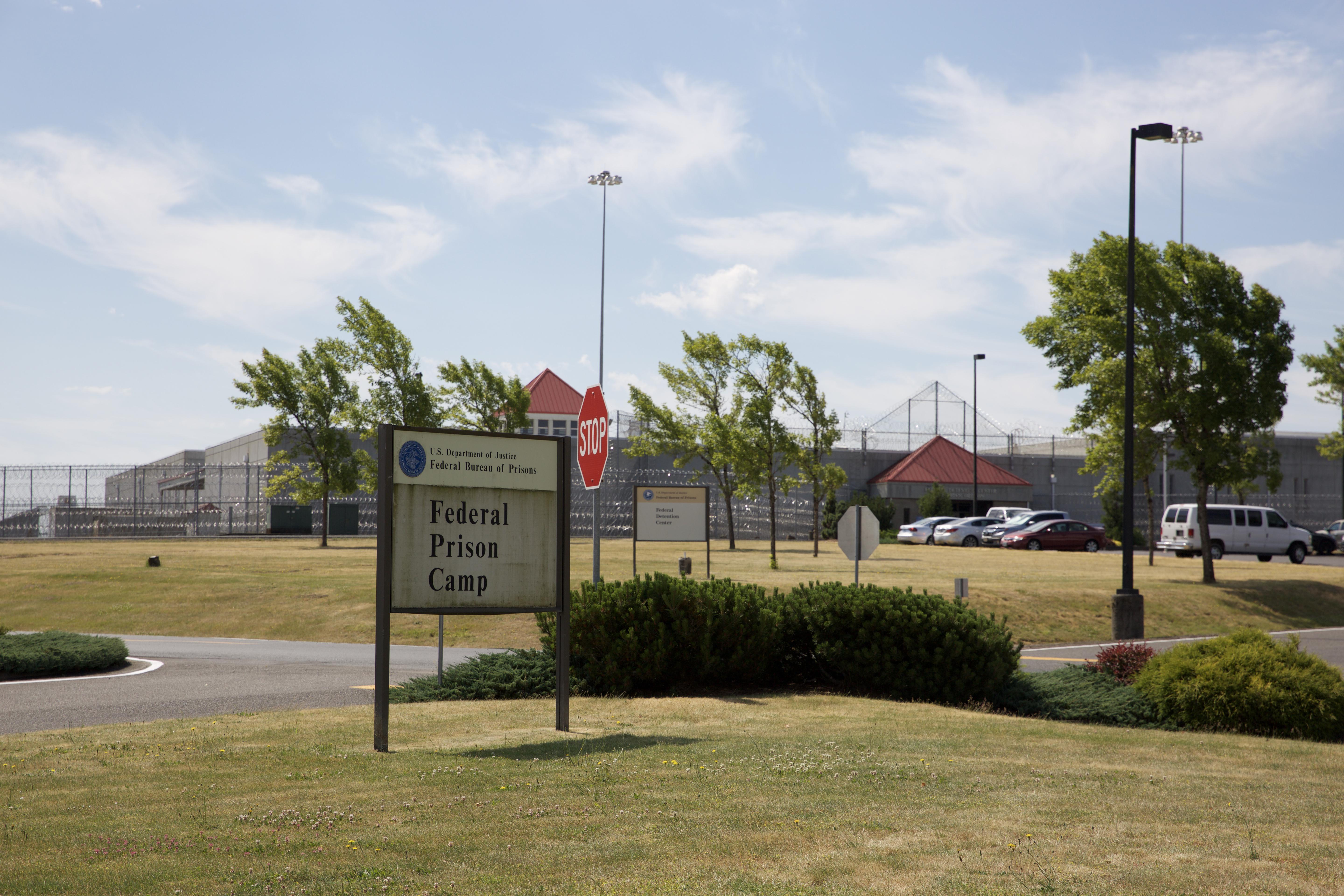
Inmates describe the Sheridan prison complex in crisis, unable to meet not just health care, but other basic needs, like clean laundry and sanitary food prep.
Dire conditions inside the federal prison in Sheridan, Oregon, have not improved over the course of the pandemic and numerous medical requests from inmates inside the facility continue to go unaddressed, according to Oregon’s federal public defender in a recent court filing.
Cancer patients have not received treatment for months. Inmates who say they’ve attempted suicide have not received the medication or mental health treatment they’ve requested.
In December, a man died in his cell, according to the Feb. 4 court filing. It’s the fourth person in the last year who died while serving their sentence at Sheridan.
Lisa Hay, Oregon’s federal public defender, described the problems inside the Bureau of Prisons run facility as below the standards required by the U.S. Constitution.
“What’s most dismaying to me is that we’re hearing the same kinds of complaints for two years and I feel somewhat helpless,” Hay told OPB in an interview Thursday. “People are dying, people are being harmed, people are being harmed psychologically and physically.”
A spokesperson for the Federal Bureau of Prisons did not respond to questions about conditions and medical care at Sheridan, but confirmed James Theodore Toms died on Dec. 26 at the Sheridan prison.
In September, after an inmate died and similar concerns surfaced over the lack of medical care, a federal judge authorized Hay and a small team to conduct an inspection at the Sheridan Federal Correctional Institution. Part of the inspection team included Dr. Michael Puerini, a certified expert in corrections health care.
“The system of care at the FCI Sheridan does not allow for adequate access to care,” Puerini stated in his inspection report. “Access to care is a fundamental aspect of the care system. Without access to care, adults in custody are essentially left without healthcare, much to their peril.”
Sheridan has quarantined inmates with COVID-19 in its gymnasium at times during the pandemic. Puerini stated that was “sub-standard care” and violated patient confidentiality.

Ericka Cruz Guevarra
“Some of the patients housed there were seemingly quite ill, having only recently been released from the hospital,” he wrote, following the September inspection. “Using an understaffed gymnasium — no healthcare staff were seen — as an infirmary is simply irresponsible.”
Since then, the omicron variant of the coronavirus has wreaked havoc on the prison. As of Feb. 1, the Sheridan facility had 216 active cases of COVID-19, the largest outbreak since the pandemic began, Hay’s latest court filing states.
In late January, inmates emailed Hay’s office, alerting her that the gym was once again being used for COVID-19 patients.
“Right now, there are about 45 people being held in the gym in Sheridan,” Hay told OPB. “The 45 people are being held in a place where there’s only a single bathroom, where the lights don’t go out. There’s no heat. And when we toured in September, there was no water supply. I’m hearing from inmates that the water right now is being provided by a garden hose, and that’s just not an acceptable way to take care of people that we are holding in custody.”
For the last two years, staffing shortages and efforts to control the virus have caused lengthy lockdowns across federal prisons, leaving inmates in their cells for hours or days.
At Sheridan, inmates have documented the situation in notes to Hay’s office.
“The emails that we receive are heartbreaking,” she said.
Taken as a whole, inmates describe the Sheridan prison complex in crisis, unable to meet not just health care, but other basic needs, like clean laundry and sanitary food prep.
At the end of January, one inmate reported the only access to fresh drinking water during lockdowns was his toilet because the prison had not yet fixed the broken faucet in his cell.
One man reported eight ear infections during the last two years. He needs his perforated eardrum repaired. While the procedure was approved months ago, as of mid-January Hay’s office said the man was still waiting.
Several cancer patients also reported they have not received treatment, despite knowing and worrying about their conditions for months.
“My last blood work that I did in Victorville, California, before I was transferred to Sheridan in October, showed that I have prostate cancer,” one inmate wrote the federal public defender’s office Jan. 11. “The doctor here said, ‘Sorry bud, we don’t have the staff or the resources to treat you because COVID has us tapped. But I MIGHT be able to get you in to see a urologist eventually.’”
In a note to Hay’s office, the inmate said his condition has worsened.
“Lately I spend every night standing over the toilet dripping cause I can’t pee. And if I go to sleep, I pee the bed. … I’m in CONSTANT PAIN I’m so worried, cause I have been sleeping on my toilet for the past week and it sucks. and I think I’m gonna die.”
The day after Christmas, corrections staff found Toms dead in his cell at Sheridan.
“He lived two cells down from me,” one inmate wrote Hay’s office on Dec. 31. “He had been sick for a long time with no medical help.”
Another email from an inmate to Hay also talked about Toms’ death.
“Over the last year he has shown serious medical issues and has fallen out numerous times and has been vocal about medical neglecting him,” the unnamed inmate wrote in an email Hay shared with OPB. “Here is another example of medical being incompetent.”
The Bureau of Prisons does not list Toms on its website where it reports COVID deaths. The Oregon medical examiner’s office said Thursday it is still investigating the cause and manner of Toms’ death. The agency said he was 52 years old.
“That’s just a major concern,” Hay told OPB. “People can die from all kinds of unusual and unexpected reasons, but when someone has been asking for care and is found dead, that’s a concern.”



